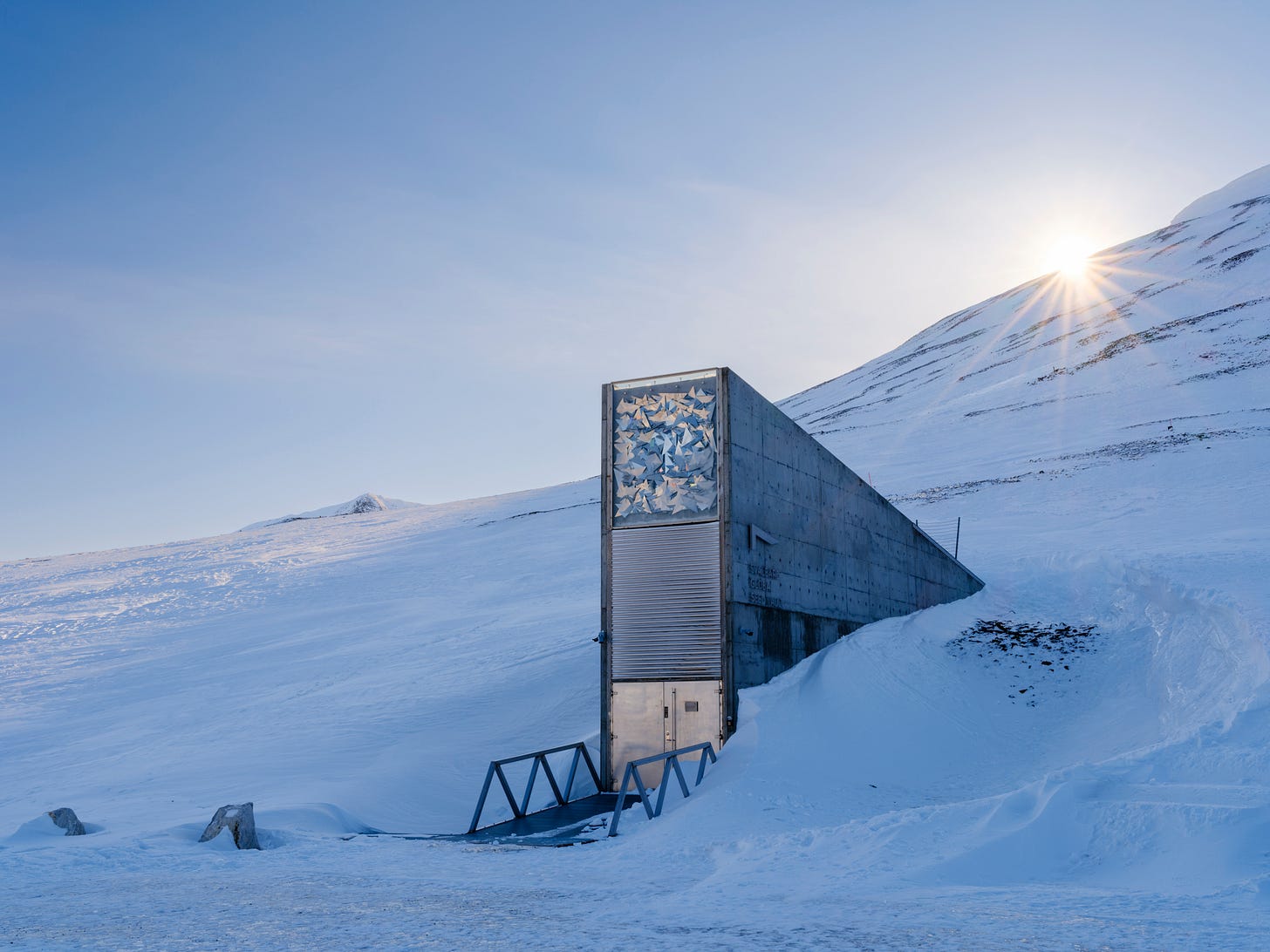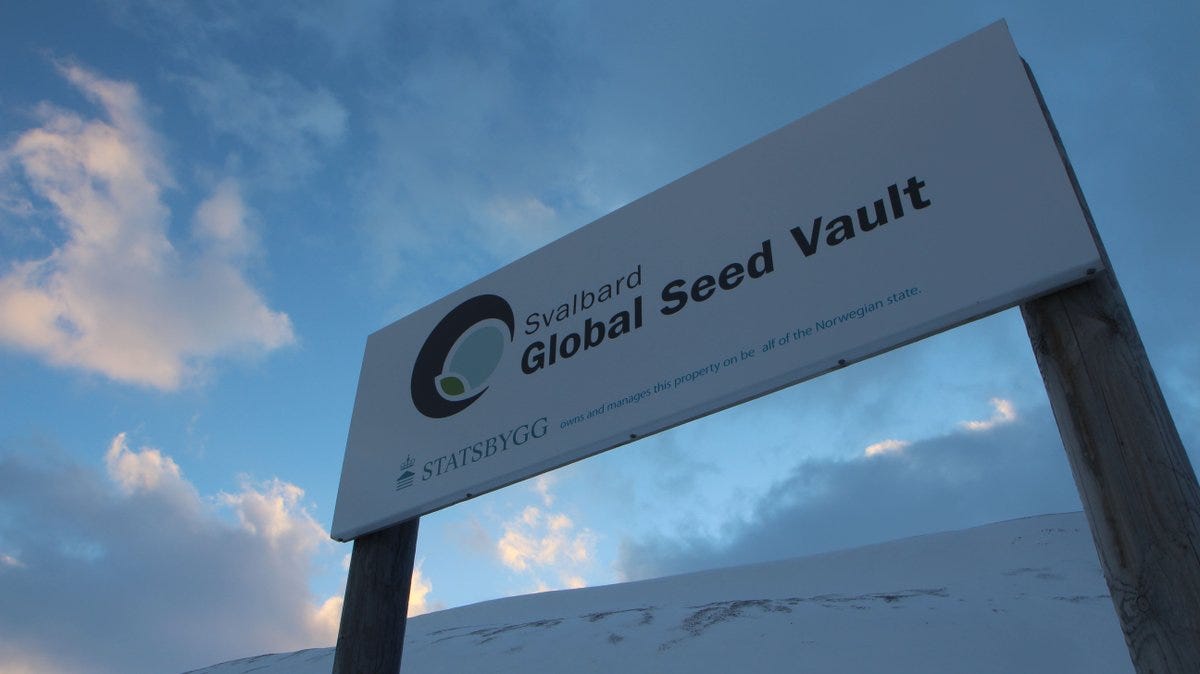Score!
Who won this year’s World Food Prize and who should sustainability-conscious voters in Europe support?
This week, I’m spreading the emotions: there’s cheery news about the winners of this year’s World Food Prize (dubbed the Nobel prize for food) and a more subdued one on the food and agricultural policy stances of political parties in the upcoming European parliamentary elections.
The former went to two noted scientists who were integral in setting up the Svalbard Global Seed Vault, sometimes referred to as “The Doomsday Vault” because it acts as an agricultural back-up in the event of disasters, whether they be big, scary events like nuclear war or climate change or the more mundane but very common problems like mismanagement and a lack of funding.
The latter showed us how Members of the European Parliament (MEPs) voted on key food issues in this parliamentary term and evaluated their commitments to a future food system that’s fair, clean, and sustainable.
I’m travelling for work and also in a bit of a crazy deadline mode so no Thin’s Pickings this week.
Score 1 - Seeds
It was a frightfully cold and windy February day in 2018 and a group of us were standing outside the futuristic-looking Svalbard Global Seed Vault building. There were journalists like me, staffers of the Seed Vault, a few officials, and scientists and conservationists from all over the world.
I was enveloped in multiple layers of down except my face, which was starting to freeze. I had heat pads inside my gloves and next to my camera, to make sure it doesn’t malfunction in the sub-zero temperature.
We were there to witness the ceremony to deposit seeds. One by one, representatives of 23 research institutions and government departments, from Kenya and Ireland to Australia and Puerto Rico, stepped up to collect their box of seeds from the back of a van, walked towards the Seed Vault, and passed them on to the team at the building’s entrance.
There were cheers for everyone but the loudest ones were reserved for ICARDA, short for International Center for Agricultural Research in the Dry Areas, based in Morocco and Lebanon.
Ahmed Amri, another tropical creature like me, dressed in a thick, deep-winter jacket, hat, and gloves, picked up a grey box and turned to us, beaming. He was depositing more than 8,600 samples of wheat, barley, lentils, chickpeas, fava beans and wild relatives of these species.
The event was particularly poignant because in October 2015, ICARDA became the first institution to withdraw seeds from Svalbard after Syria's civil war had damaged a seed bank near the city of Aleppo. The seeds were then multiplied, distributed, some were kept locally, and now they were re-depositing.
When I spoke to Ahmed a day earlier, he couldn’t hide his pride and joy. “This is a big achievement,” he said.
The ceremony was fleeting but that moment stayed with me. That trip helped me to understand the critical importance of conserving seeds.
The Pioneers
It’s easy to see why this particular seed bank, established in 2008 and now holding 1.25 million seed samples of more than 6,000 plant species, captures people’s imagination.
First, there’s the location: the Svalbard archipelago is the furthest north reachable on a scheduled flight. It is a remote island above the Arctic Circle where polar bears roam. There are signs in Longyearbyen, the capital of Svalbard on the island of Spitsbergen, warning visitors not to wander outside the town on their own.
Secondly, there’s the building’s modernist, minimalist aesthetics: a narrow concrete prow jutting out of a mountain takes you to three underground chambers built 120 metres into the rock.
The last - but definitely not the least - is the concept that a cavernous bunker, deep under the permafrost, where neatly stacked boxes kept at minus 18 degrees Celsius (0F), is the key to much of our agricultural past as well as the future.
Dr. Geoffrey Hawtin and Dr. Cary Fowler were “instrumental” in the vault’s establishment, said the World Food Prize Foundation in the press release announcing the winners.
In fact, the vault was the brainchild of Cary, “who wrote to Norway’s Ministry of Foreign Affairs to ask them to consider establishing such a facility during his time at CGIAR, the world’s largest publicly funded agricultural research organization.”
“He was later invited to chair a committee to assess the feasibility of such a project and served as the first Chair of the Vault’s International Advisory Council.”
Geoffrey, meanwhile, “served as a member of the original study team, scoping the viability of the Svalbard Global Seed Vault and drew up its technical specifications.”
He then created the Global Crop Diversity Trust, or Crop Trust, in 2004, which now finances the vault together with the Norwegian Ministry of Agriculture and Food and the Nordic Genetic Resource Center.
Even before the vault materialised though, both had been active champions of conserving and sharing seeds, and they “also played pivotal roles in the development of the International Treaty on Plant Genetic Resources for Food and Agriculture, or Plant Treaty, which was adopted in 2001, to facilitate the global movement of plant genetic resources”, the World Food Prize Foundation said.
“By codifying international agreements and mechanisms for the sharing of seeds, the treaty laid the foundations for the Svalbard seed vault.”
Unprecedented Challenges
I’ve not met Geoffrey, but I was lucky enough to interview Cary during my trip to Svalbard in 2018. He was acting as an advisor to the Crop Trust then, and I found him passionate, affable, and eloquent.
People told him the vault was “a crazy idea”, he said, but he fervently believe in the need to protect the biodiversity of our agricultural crops, which has been shrinking further and further. The same thing is happening to our diets too. Today, more than 40% of global calorie intake comes from only three crops - wheat, rice and maize - which makes us very vulnerable to any changes in the productivity of these crops.
“We’ve been losing diversity… a lot of it in the last 100 years. And as we lose diversity, we lose our options for the future. And that’s what we can’t afford to have in a world that is growing in terms of population and facing all the challenges that our food system is facing,” he said at the time.
But there is a solution, he said.
“This is a world problem that’s almost unlike any other world problem in that it’s a problem we can actually solve. It’s doable, it doesn’t take a huge amount of money and it doesn’t take technology that doesn’t currently exist. We know how to do it, we know how much it’ll cost, the benefits are tremendous. The cost of not doing it is also tremendous.”
“I think agriculture faces a historically unprecedented combination of challenges. At the top of the list is climate change. We’re looking at climates in the near future that haven’t existed in the entire history of agriculture in a number of countries, particularly developing countries.”
“So you have to ask yourself the question. Is our agriculture, our crop varieties today, well-adapted to climates that they’ve never experienced before as a species? And my assumption is, probably not. We have to be careful and proactive to make sure that agriculture does get ready for climate change.”
Cary is currently the U.S. Special Envoy for Global Food Security and he has continued to champion crop diversity. A recent New York Times article about him showed him advocating for bringing back traditional African crops “like cowpeas, cassava and a range of millets” that are sturdy and full of nutrients not only for those who eat them but also for the soil in which they’re grown.
Here’s hoping that becoming the World Food Prize laureate will give that project a big boost!
Score 2 - Policies
A few weeks ago, I was chatting with Kelly, my good friend and Kite Tales partner-in-crime, about solutions to the climate crisis and she said a key solution that journalists tend to overlook is government policy.
Of course, as someone who has been covering food policy, I agree. Good policies can really move the needle on so many things including climate change and food systems, and bad policies can lock in destructive behaviour that could have repercussions for generations.
So I was interested to see that organisations in the EU Food Policy Coalition has scored the voting records of MEPs and their political groups on whether they “supported or rejected initiatives promoting health, biodiversity, justice, and equity in Europe’s food systems” during the last mandate (2019-2024).
The EU Food Policy Coalition, as the name says, is a collection of civil society actors and farming groups, ranging from aid agencies like Action Against Hunger to groups like The European Consumer Organisation, Slow Food, and the environmental law charity Client Earth.
To assess the MEPs and their political affiliations, the votes were segmented into five categories - whether they recognise the need for a transition and support it, whether they enable access to healthy and sustainable diets, whether they are committed to improving social justice for farmers and citizens, their stance on nature-friendly farming and shifts towards agroecology, and their support for a transition towards ethical animal production.
These categories are then further broken down into specific votes on specific files. For example, for the first segment, voting records in three key votes related to the Farm to Fork Strategy, the Soil Monitoring Law, and the rejection vote of the Sustainable use of Pesticides were considered.
Healthy and sustainable diets seem to have the broadest support or at least the least amount of objections, while ethical animal production and nature-friendly farming seem to generate the most “against’ votes.
Perhaps it is not surprising that the further right the political grouping is, the more they vote against policies that could result in a sustainable food system. The Greens-European Free Alliance (EFA) is the most consistent in supporting these policies.
It’s a sobering thought, considering all the political punditry about how the elections will result in a hard-right European parliament.
You can find more information on the methodology as well as the scorecards here.
As the election dates draw nearer and nearer - Jun 6 - 9 - more and more citizens worried about Europe’s future are also finding ways to mobilise, to prevent populist, anti-immigrant, anti-environment, pro-dictatorship parties becoming the dominant players in the parliament for the next five years.
This week, four concerned researchers of Wageningen University & Research launched Europe for Nature, a new initiative “in which scientists and experts share their stories and - in the run-up to the European elections - urge Europeans to prioritise nature and sustainability in the decisions they take”.
Jeroen Candel, one of the founders, is someone whose work I respect and follow, and he’s asking for contributions from citizens, students, researchers, and experts. Here’s his LinkedIn post announcing the initiative.
As always, please feel free to share this post and send tips and thoughts on mastodon @ThinInk@journa.host, my LinkedIn page, twitter @thinink, or via e-mail thin@thin-ink.net.










Thin, I think that's so awesome that you were able to visit the Seed Vault! I've read so many articles on it and have seen some pictures of the outside, but it's so cool to know someone who has actually been there. Seed saving is honestly the lifeline for the future of global agriculture so it's great to see it getting recognition after all these years.